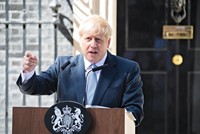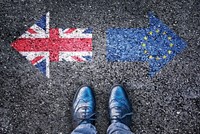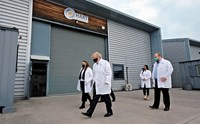Advertisement
Grab your lab coat. Let's get started
Welcome!
Welcome!
Create an account below to get 6 C&EN articles per month, receive newsletters and more - all free.
It seems this is your first time logging in online. Please enter the following information to continue.
As an ACS member you automatically get access to this site. All we need is few more details to create your reading experience.
Not you? Sign in with a different account.
Not you? Sign in with a different account.
ERROR 1
ERROR 1
ERROR 2
ERROR 2
ERROR 2
ERROR 2
ERROR 2
Password and Confirm password must match.
If you have an ACS member number, please enter it here so we can link this account to your membership. (optional)
ERROR 2
ACS values your privacy. By submitting your information, you are gaining access to C&EN and subscribing to our weekly newsletter. We use the information you provide to make your reading experience better, and we will never sell your data to third party members.
Biological Chemistry
Brexit leaves cloud of uncertainty looming over academic scientists
The 2016 referendum has caused some chemists to leave the U.K., others to wait with trepidation
by Katharine Sanderson
October 25, 2017
| A version of this story appeared in
Volume 95, Issue 43
Paul Kamer was a chemistry professor at the University of St. Andrews in Scotland when the U.K. voted to leave the European Union on June 23, 2016. An EU national originally from the Netherlands, Kamer says his next steps were clear after he switched on BBC News the next morning to learn the outcome of the so-called Brexit referendum.
“I started to organize my own Brexit,” Kamer says. “My decision became final when the U.K. government announced that the status of EU citizens would become part of the negotiations. I have no faith whatsoever in the policies of Westminster politicians.”
Kamer, who studies homogeneous catalysis and develops artificial enzymes to convert biomass into renewable feedstocks, is now a professor at the Leibniz Institute for Catalysis in Germany.
Although there are no hard numbers on how many have left, Brexit, which was decided narrowly when 52% of voters checked the “leave EU” box, has triggered a number of academic scientists to abandon the U.K. The vote revealed bitter divisions among British citizens over immigration, the economy, and sovereignty in Britain. It even prompted then-prime minister David Cameron to prematurely exit political life.
With the U.K. not set to officially split from the EU until March 2019 and negotiations over the future relationship between the two parties likely to drag on long afterward, academic researchers in the U.K.—both citizens and EU nationals—wait anxiously to see how the split will change their lives. Will academic scientists who are EU citizens be forced to leave the country? Will research funding from the EU disappear? Will scientific collaborators withdraw from partnerships with U.K. scientists?
“When you don’t know the deal, everything is a concern,” says Tom Welton, dean of the Faculty of Natural Sciences at Imperial College London.
Cash on the horizon
About 17% of the academic researchers at U.K. universities are EU nationals who don’t currently have British citizenship. As their fate hangs in the balance, other researchers in the U.K. worry about whether they will still be able to access grant money awarded by the Horizon 2020 funding program, which includes the European Research Council (ERC), the organization that funds EU science and technology research. Launched in 2014, Horizon 2020 is a seven-year, almost €80 billion funding program for scientists that actively promotes collaborative projects from all corners of Europe.
U.K.'s slice of the EU pie
Note: Data are as of April 2015.
Source: European Commission

Note: Data are as of April 2015.
Source: European Commission
This source of EU money is a big deal for U.K.-based scientists. In the first 100 calls for scientists to apply for funding from Horizon 2020, the U.K. was awarded the greatest share of grants among all 28 EU member states and was given the second-largest amount of funds. According to the European Commission, the U.K. received 3% of its research funding during 2007–13 from FP7, the predecessor program to Horizon 2020. A report from the Royal Society before the Brexit referendum suggested that this figure was an underestimate because of the criteria used to calculate it. Another report, commissioned by the U.K. national academies, puts the figure at more than 9%.
No matter what the percentage funding, if U.K. scientists lose access to current or future Horizon 2020 funds, “it would just be awful,” Welton says.
In the months after the referendum, U.K. Prime Minister Theresa May’s government assured scientists in the country that the Treasury would underwrite any EU money lost to them after Brexit. Once Brexit is complete, the U.K. might also qualify for Horizon 2020 funding as a “special case”: Researchers in Israel, Norway, and Switzerland—countries outside the EU—are currently considered special cases and can apply for ERC and Horizon 2020 money.
The U.K.’s Department for Exiting the EU (DExEU), which is responsible for negotiating the country’s departure and fathoming what a future relationship with the EU will look like, released a position paper in September explaining that it wanted to stay involved in EU collaborations. The paper did not explicitly mention details on how this would happen.
For some researchers, this position paper and the promise to underwrite lost funds is assurance enough. Ian Robinson, a physics professor at University College London’s London Centre for Nanotechnology, says, “I was initially concerned about whether the U.K. would remain in the ERC funding mechanism, and it now looks fairly optimistic that it will” in the same way that Switzerland is a special case.
Still, many remain ill at ease. The group Scientists for EU—set up before the referendum by concerned researchers Mike Galsworthy, a policy consultant, and Rob Davidson, a data scientist—vociferously criticizes the U.K. government’s plans. After DExEU’s September position paper came out, the group and partners responded with a statement saying it was “good and entirely expected that the UK wishes to maintain the maximum possible relationship with the EU and European partners in science. However, the Government’s paper is utterly devoid of any suggestions for bridging Brexit obstacles and developing this partnership into the future.”
Mistrust in the government’s assurances also fed into Kamer’s decision to leave. “The majority of my research funding came from EU grants, and I was absolutely confident that the U.K. government would not keep their promise to replace EU funding with national funds,” he says.
Beyond funding, maintaining collaborations is also worrying academic researchers in the U.K.
Welton is cautiously optimistic about the potential to remain in close partnership with EU colleagues. “There’s nothing about being in the EU that has prevented us from having collaborations with Australia, the U.S., etc.,” he says. If the U.K. is separate from the EU, those collaborations should continue, too.
But he has heard anecdotally of scientists participating in EU-funded projects who are now less than thrilled about U.K. scientists leading those projects. “People want security,” he explains, and it’s unclear whether U.K. scientists will be able to access EU funds in the same way after Brexit. People fear that if someone working on a project is no longer eligible for the funding, the whole collaboration will fall apart.
Kamer was collaborating on a catalysis project with Simon Aldridge, a chemist at the University of Oxford, before leaving the U.K. For Aldridge, the move of his collaborator from the U.K. to Germany has delayed progress while Kamer’s new lab in Germany is being set up. And logistics are now more problematic. Rather than hopping on a train across the island, Aldridge now has to deal with an international flight to see his collaborator—a journey that will get only more complex and likely more expensive once Brexit is final.
Having permission to live and work in the U.K. could be another new hurdle that EU citizens need to clear. Welton points out that many EU scientists have lived and worked in the U.K. for many years but have never felt it necessary to become U.K. citizens. Part of the Brexit negotiations will include what happens to such people. After the referendum, Imperial acted swiftly to support its numerous staff from the EU. “We immediately started offering free legal advice for those wanting to obtain U.K. citizenship,” Welton says.
“I will not mention names, but some of the best scientists in academia in the U.K. are already on the move, and many more are mentally prepared to make a move in the near future,” says Fraser Stoddart, a chemist at Northwestern University and British citizen who is a vocal opponent of Brexit. Stoddart has been based in the U.S. since 1997.
Application decline
International research community
Note: Statistics are for 2015–16.
Source: Higher Education Statistics Agency, hesa.ac.uk/stats

Note: Statistics are for 2015–16.
Source: Higher Education Statistics Agency, hesa.ac.uk/stats
If moving easily between the U.K. and the EU does indeed become more difficult, the U.K. could also have a harder time attracting and retaining top scientific talent. For Stoddart, who shared the 2016 Nobel Prize in Chemistry, the impact of Brexit on the U.K.’s ability to woo talented scientists is clear: “I am sure many who would have come to the U.K. under normal circumstances will no longer come.”
It is too early to get hard numbers on whether the vote has already affected recruitment of staff and students, Welton says. He has heard rumblings that there have been fewer applications for academic positions than would be expected. “It is a real threat,” he says.
Scientists for EU’s Davidson says that in the group’s information-gathering exercise since the referendum, signs that the U.K. is getting fewer EU applicants are already apparent: One team leader at a major London university told Scientists for EU that annual postdoc recruitment would normally bring in about 20 submissions from EU applicants. This time around, it yielded only three. “It’s difficult to know the size of the problem,” Davidson adds. But “primary investigators have told us they’ve offered positions to applicants from abroad who have turned the job or studentship down and cited Brexit as the reason.”
Welton predicts that for the top-rated, most prestigious institutes in the U.K., little will change in terms of their competitiveness on an international stage.
Aldridge disagrees. Oxford won’t be shielded from any of the negative effects of Brexit, he says. And he doesn’t necessarily believe the government’s promises to replace any lost EU funding. “If we can’t apply to the EU and the government is not backfilling that funding stream, then people will leave,” he says. “It’s inevitable.”
“The concerns aren’t whether we can recruit a high-flying professor,” Welton argues. “The Ph.D. students are the engine of what we do,” he says. “My concern is about our ability to maintain the highest quality of Ph.D.s and postdocs.”
One EU funding scheme that’s particularly beneficial to young researchers is the Marie Curie fellowships, which offer EU scientists a chance to live, work, and train in another country. The program provides “a fantastic pool of talent,” Aldridge says. He is worried about whether the U.K. can still participate in the scheme after Brexit is final in 2019.
Tatjana Parac-Vogt, a bioinorganic chemist at Belgium’s KU Leuven, has been involved in the scheme as an evaluator. Parac-Vogt says the U.K. has benefited disproportionately from the program because of the U.K.’s attractiveness as a place for postdocs to live and work. The Marie Curie individual fellowships, for example, are hugely competitive, with a success rate of only 12 or 13%, Parac-Vogt says. “It’s a huge stepping stone for a further career,” she says.
If the U.K. drops out of the scheme post-Brexit, it would be “a huge pity,” Parac-Vogt says. “I think it will be a huge blow to U.K. science.”
Procurement problems
Many of the effects of Brexit thus far have been based on the uncertainties around how the split will play out. One tangible effect is that expensive pieces of imported equipment are set to become even more pricey. Since the Brexit vote last June, the value of British currency has plummeted against the euro and other currencies.
At King’s College London, Sasi Conte, a professor of structural biology, is concerned about the weakened pound. She was in the process of buying two expensive nuclear magnetic resonance spectrometers when the referendum results came in. With the manufacturer setting prices based on exchange rates at regular intervals during the year, Conte realized that she had to get on with the purchase urgently; otherwise there wouldn’t be enough money to pay for the machines. Most of the equipment funding came from medical charities, she explains, and it would have been difficult to find more money to cover any increase in price due to changes in exchange rates. “In the end we got the machines,” she says. “But it was a mad rush.”
Down the hallway at King’s, Conte’s colleague James Mason experienced the same problem. He was alarmed to learn that the state-of-the-art NMR spectrometers he was in the process of acquiring might increase in price by 15%. “In the end we had to conduct all our procurement in a very rushed way,” he says. Prices of imported instruments remain higher than before the vote, as the pound’s value has dropped by 15% compared with the euro.
Advertisement
As the details of Brexit begin to emerge, Welton doesn’t expect an easy ride. “Even if in 20 years it will be okay, the transition will be really, really difficult,” he predicts. Mason says the government is making “encouraging noises” with its commitment to backfill funding. One such noise was made on Oct. 19, when Prime Minister May stated that EU nationals currently living in the U.K. would continue to have their rights to live and work in the U.K. protected.
Stoddart is adamant that history will not look kindly on the architects of Brexit or the narrow margin by which it was voted into action. “Historians will ask why a country that had managed to get itself back on the rails big-time after the loss of the empire over half a century ago would decide to commit kamikaze on the basis of a referendum with the equivalent of an enantiomeric excess of 3.6%,” he says. “Using this statistically insignificant result as a reason to invoke a constitutional crisis in the U.K. is nuts.”
Katharine Sanderson is a freelance science writer based in the U.K.






Join the conversation
Contact the reporter
Submit a Letter to the Editor for publication
Engage with us on Twitter